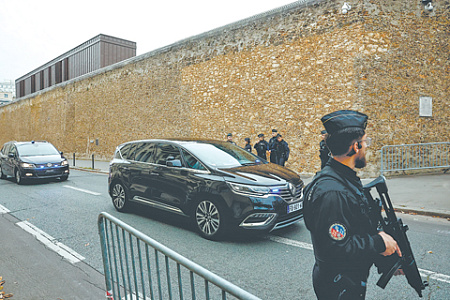
In a dramatic turn of events that has captivated France and drawn international attention, Nicolas Sarkozy, the former President, found his brief stint behind bars abruptly curtailed this month, mere weeks after becoming the first modern French head of state to be sentenced to actual prison time. Convicted in late September for “conspiracy to commit a crime” linked to alleged illegal financing from then-Libyan leader Muammar Gaddafi for his 2007 presidential campaign, the 70-year-old politician was released on November 10, pending his appeal.
Sarkozy’s initial incarceration began on October 21, approximately a month after his conviction. However, his legal team promptly filed an appeal, leveraging France’s robust principle of presumption of innocence until a final verdict is reached – a process expected to extend until at least spring 2026. Article 144 of the French Code of Criminal Procedure dictates that detention prior to a definitive conviction requires specific grounds, such as a flight risk, potential to tamper with evidence, or pressure on witnesses. Significantly, even the prosecution argued against his continued confinement, stating there was ‘no risk of concealing evidence, pressure or collusion,’ thus rendering further detention unwarranted.
Central to the defense’s strategy is the assertion that investigators failed to conclusively prove that the alleged funds from Gaddafi were indeed channeled into Sarkozy’s victorious 2007 presidential campaign, thereby challenging the motive behind the purported transaction. The former President himself has vehemently denied the charges, claiming to be the victim of a ‘conspiracy’ orchestrated by elements connected to the Libyan government. He posits that the accusations are a retaliatory measure for France’s leading role in the 2011 NATO intervention that led to Gaddafi’s overthrow, a campaign in which allied air strikes and special forces played a decisive role.
The former President’s release from La Santé prison in Paris, at 3 p.m. local time, was a discreet affair. His wife, Carla Bruni, collected him in a car with tinted windows, denying eager journalists the iconic image of a former head of state walking free from prison. The court, while granting release, imposed strict conditions: Sarkozy is prohibited from leaving France and from contacting former Justice Minister Gérald Darmanin, who had visited him in prison on October 29, a move that sparked controversy over potential interference with judicial independence.
During his hearing, a visibly distressed Sarkozy, aged 70, described the ordeal of imprisonment, reiterating his innocence. “I know this is not the place to discuss the merits of my case. But I never had the slightest thought or foolish intention to ask Mr. Gaddafi for money. And I will never confess to something I did not do,” he declared. “I never thought I would live to be 70 and go to prison. This is an imposed ordeal. It is hard, very hard. It leaves its mark on every prisoner because it is exhausting.” This current battle is not his first encounter with the French justice system; Sarkozy has been convicted twice before, for corruption and influence peddling, and for illegal campaign overspending in 2012, showcasing his extensive experience in navigating and challenging legal proceedings.
The judicial proceedings against Sarkozy have sharply divided French public and political opinion. His supporters and some politicians allege judicial bias, with even current President Emmanuel Macron drawing criticism for a ‘human’ visit to Sarkozy in prison, while carefully refraining from commenting on the verdict itself to uphold judicial independence. Conversely, figures like François Ruffin of the far-left ‘Unbowed France’ party have vehemently advocated for Sarkozy’s continued incarceration, reflecting a significant segment of public sentiment. An October 1 survey by French consulting firm Elabe revealed that 58% of respondents believe judges acted impartially, and 61% found it just to imprison the former president before all appeals were exhausted. A striking 80% also opposed a presidential pardon from Macron, an option that, in any case, cannot be exercised until a final conviction is secured, likely not before 2026, by which time Macron may no longer be in office.
Despite his temporary reprieve, Sarkozy’s legal challenges are far from over. He remains under investigation in a separate case concerning alleged witness tampering related to the Libyan funding scandal, which could lead to further charges. The unfolding saga underscores the complex interplay of power, justice, and public perception in France, setting a significant precedent for the accountability of former heads of state on the international stage.
